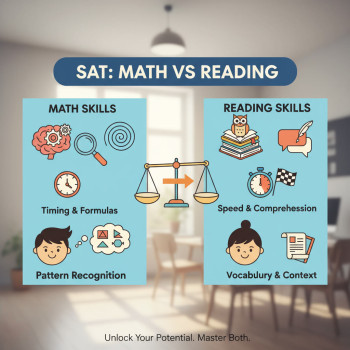Take a breath — missing an SAT date is stressful, but it isn’t the end of the road
There’s a small moment of panic when the realization hits: your teen missed the SAT. Maybe they misread the time, slept through an early alarm, dealt with a family emergency, or were turned away at the center because of a missing admission ticket. Whatever the reason, the first thing to know is practical: this is common, and there are clear steps you can take.

Quick overview: what typically happens if a student misses the SAT
Short version: if a student is absent for a scheduled SAT administration, they do not receive a score for that date; registration fees are generally forfeited unless the student canceled registration ahead of the deadline or qualifies for a refund under specific circumstances. There are options — including re-registering for a future date, requesting score cancellation if there’s ambiguity, and reporting test-day incidents to College Board — but timelines and policies matter.
Key time-sensitive rules to keep in mind
- Cancel registration before the test: You can cancel registration before test day and potentially get a refund (in most cases you’ll receive a refund of the registration fee but may be charged a cancellation fee if you do it by the posted deadline).
- Cancel scores after testing: If the student took the test and then decides they don’t want the scores reported, there are short windows to cancel scores: generally up to one week after a weekend SAT and a shorter window for SAT School Day administrations. After those windows pass, scores are processed and cannot be canceled for reporting reasons.
- Report test-day problems quickly: If something happened at the testing center (e.g., device problems with the digital SAT, disruptive conditions, or other issues), contact the SAT program within a few business days so the incident can be investigated before scores are released.
Understanding the difference between “missed the test” and “took but want to cancel”
These two situations have different consequences:
- Missed the test (no-show): No score is produced for that date. Registration fees are usually forfeited; you’ll need to register and pay for another administration.
- Took the test but want to cancel scores: If your teen left feeling they didn’t do their best, there are short windows to cancel scores so they aren’t reported to colleges. Canceling scores after you’ve left the test center is possible, but deadlines are strict and once canceled, scores can’t be reinstated.
When refunds are possible
If you cancel registration before the published cutoff (often the Thursday before a weekend test), you can typically receive a refund of the registration fee, though a cancellation processing fee may apply. If your student is simply absent on test day and did not cancel registration in time, the registration fee is usually not refunded.
Concrete steps to take the moment you realize your teen missed the SAT
Act calmly and follow this checklist — the sooner you act, the more options you’ll keep open.
- Pause and collect facts: Confirm whether they were officially marked absent, if they arrived late but were admitted, or if the center prevented them from testing for some reason (documentation helps).
- Check the registration status online: Sign in to the student’s College Board account to confirm registration, fees, and any messages from the testing program.
- Decide whether the student actually took any part of the test: If they took the test and want to cancel reporting, act quickly within the cancellation window.
- Report test-day incidents: If there were technical or administrative problems, file a report with the SAT program right away — there are strict reporting timeframes for test-day complaints and ambiguous questions.
- Plan a next test date: Look at upcoming SAT dates, weigh college application timelines, and register early (late fees may apply if you register close to the date).
Sample timeline checklist
| Event | Typical Deadline | What it means |
|---|---|---|
| Cancel registration (refund) | By the Thursday before a weekend test | Possible refund of registration fee minus cancellation fee |
| Cancel SAT Weekend scores | Within 7 days after test | Scores won’t be reported and cannot be reinstated |
| Cancel SAT School Day scores | Within 5 days after test | School-day cancellations handled through school testing staff |
| Report test-day problems | Within 4 weekdays after test administration | Allows College Board to investigate before scores are released |
If the teen had a true emergency — illness, family crisis, or center closure
Emergencies change the conversation. If your student missed the test because of a verified emergency — a serious illness, medical documentation, travel disruptions, or center-level problems — contact the test program and explain the situation. In some cases, documentation may enable a refund or special consideration. Keep notes, receipts, and any supporting documents; that paperwork can make a difference.
How to communicate effectively with the testing program
- Be prompt. There are narrow windows to submit complaints or requests.
- Be factual. Provide dates, times, locations, and any supporting documents (doctor’s notes, travel advisories, emails from the center).
- Ask for clear next steps: Will the registration be refunded? Can the student be moved to a different date? What documentation is required?
College application strategy after a missed SAT date
Missing a test date can feel like a big hit to the college timeline, but many students recover without long-term consequences. Here’s how to keep your application on track.
1. Prioritize application deadlines
Work backward from college deadlines. If the student needs an SAT score for an early decision or scholarship deadline, you may need to register for the next available test and, when possible, request rush score reporting. If score reporting timelines can’t be met, contact the colleges — many admissions offices are used to these situations and can advise on alternatives.
2. Communicate with your school counselor
School counselors are allies. They can confirm whether SAT School Day policy or local practices apply, help with documentation, and sometimes provide guidance on meeting application timelines or coordinating late testing options.
3. Consider alternatives and safety nets
- Some colleges are test-optional; check each college’s policy to see whether a missing SAT will truly matter.
- Look at sending other components to strengthen the application: a stronger transcript, teacher recommendations, personal statements, AP scores, or grade trends.
- Plan a fallback test date early so the student can retake if needed — registration caps and center availability fill up, so registering sooner is prudent.
Realistic timeline to expect after re-registering
Once you re-register, factor in study time and score reporting. For the digital SAT, students should allow time for:
- Preparation: even a focused month of deliberate practice can produce meaningful improvement.
- Score processing and reporting: plan to register early enough to meet college deadlines; if you need scores quickly, some administrations offer rush reporting for an extra fee.
How to turn a missed date into a resilience-building moment
Missing a test date can be reframed as an opportunity. It’s a chance to step back, create a better study plan, and approach the next administration with more confidence. Here are practical ways to transform disappointment into progress:
- Debrief: Ask what went wrong logistically and emotionally. Was it time-management, anxiety, or something out of your control?
- Create a realistic, measurable plan: set weekly practice goals, timed sections, and one or two full practice digital administrations to build stamina.
- Get targeted help: a tailored tutor or coach can accelerate improvement without wasting time on what the student already knows.
Where personalized support helps most
Targeted, one-on-one guidance is especially useful after a missed test date. Personalized tutoring can help a student focus quickly on weak areas, create a study calendar that fits around school responsibilities, and practice digital test logistics so the next test day feels routine rather than risky. Sparkl’s personalized tutoring, for example, offers 1-on-1 guidance, tailored study plans, expert tutors, and AI-driven insights that streamline practice in the weeks leading up to the next administration — a helpful option for families who want structure and accountability without wasting time.
Common scenarios and what to do in each
Scenario: Overslept or misread the test time
Reality: If the student simply wasn’t at the center on test day, there’s no score and the registration fee is typically forfeited. Next steps: re-register for the next available date, analyze what went wrong with scheduling, and use a reliable calendar system and multiple reminders to prevent a repeat.
Scenario: Arrived late and was denied entry
Reality: Some centers will not admit late arrivals. If there is a dispute (for example, ambiguous instructions or delays caused by the center), document the situation and file a report with the testing program within the required timeframe so it can be investigated.
Scenario: Device or technical problem during the digital SAT
Reality: If the testing device failed or Bluebook didn’t function correctly, report the issue to the test center staff immediately and then file an incident report with the testing program within the allowed timeframe. They may investigate and determine next steps, which could include cancelling scores or issuing a new testing opportunity in certain circumstances.
Practical tips to avoid a missed test in the future
- Use multiple reminders: phone alarms, calendar apps, and a physical calendar at home.
- Do a full digital test practice at home with the same device and setup to avoid surprises on test day.
- Confirm admission ticket and testing device setup a week in advance and again the night before.
- Have backup plans for travel to the center: alternate drivers, public transit options, or arrival windows that leave time for delays.
- Arrange a restful night and a simple breakfast — stress and lack of sleep hurt performance.

When to contact colleges directly
If a missed or late score might affect application deadlines—especially for early action or scholarship consideration—reach out to admissions offices promptly and honestly. Explain the situation concisely, note any documentation you have (e.g., test-center closure or medical note), and ask whether they’ll accept late scores or consider alternatives. Many offices are pragmatic and will tell you the best path forward.
Final words: make a plan, and don’t go it alone
Missing the SAT feels big in the moment, but with a calm checklist and realistic timeline, most students recover quickly. The keys are to act fast, document what happened if it involved a problem at the testing center, re-register thoughtfully, and use the time before the next test to prepare targeted practice rather than broad, unfocused study.
If your teen could use structure and confidence between administrations, consider a tailored approach: one-on-one tutoring that focuses on their gaps, builds test-day routines, and offers practice under realistic digital conditions. Services like Sparkl provide personalized tutoring, tailored study plans, expert tutors, and AI-driven insights that help students maximize their study time and show up to the next test feeling prepared.
Above all, remember this: colleges are looking for consistent achievement and potential, not perfection. A missed test date is a hiccup — manageable with good communication, thoughtful planning, and the right support.
Action checklist to download into your calendar
- Within 24 hours: Confirm registration status and document the reason for missing the test.
- Within 3–4 weekdays: File any test-day incident reports with the testing program if center problems occurred.
- Within 7 days (weekend SAT) or 5 days (School Day): Consider score cancellation if the student took the test and doesn’t want scores reported.
- Within 1 week: Re-register for the next best available test date and create a 4–8 week study plan with focused practice.
- Ongoing: Communicate with schools or counselors if deadlines are at risk and seek tailored tutoring support if needed.
If you’d like, I can help you draft an email to a college admissions office or a message to the SAT support team, or outline a focused 6-week study plan tailored to your teen’s current score level and schedule. Just tell me which you’d prefer to start with.















No Comments
Leave a comment Cancel